Election stirs hope and action: Get involved!
By Brenda Ortega
MEA Voice Editor
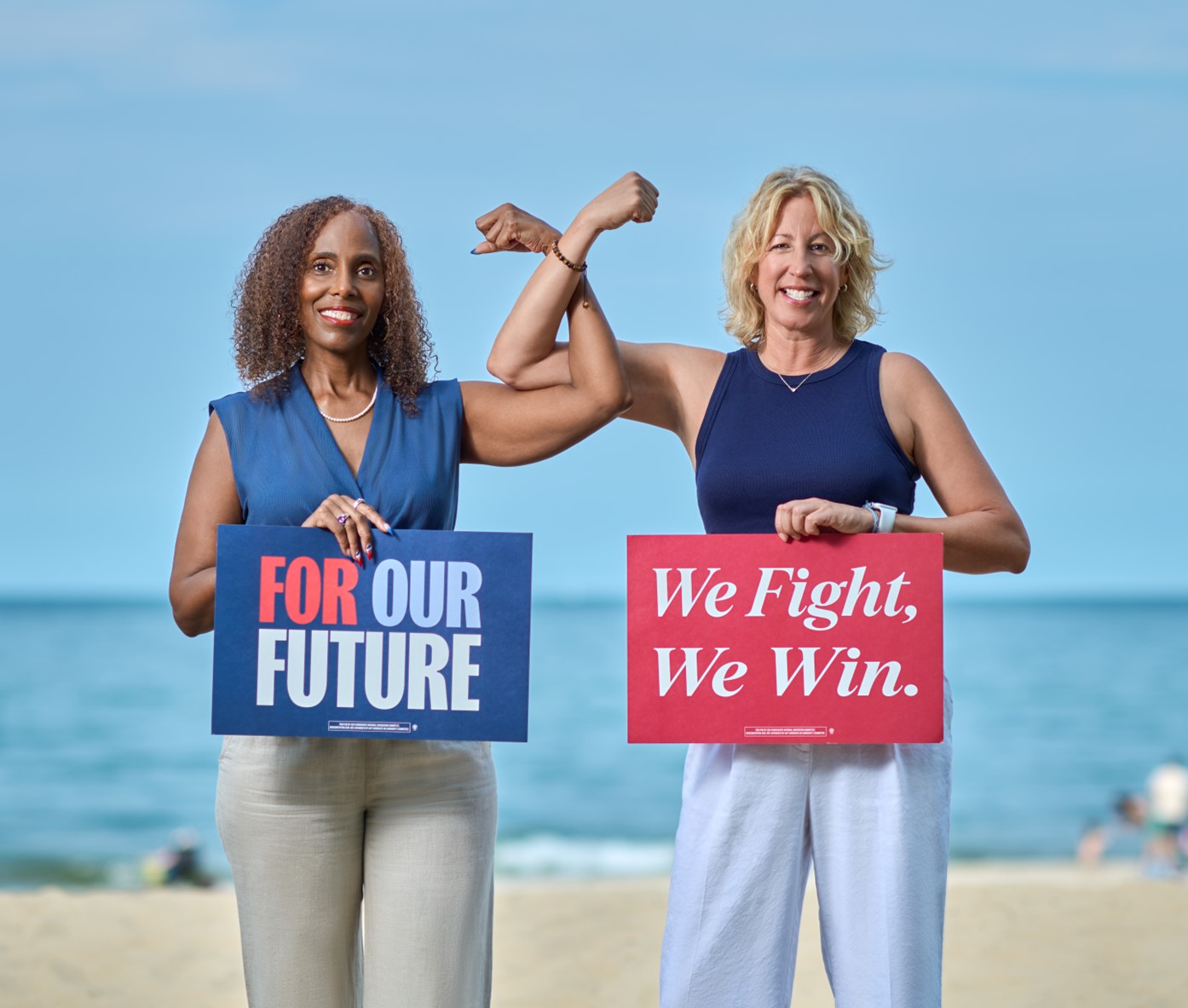
As a professor of organizational psychology, MEA member Amy Scrima knows it’s not simple willpower that prompts people to do difficult tasks. It’s hope.
“When we human beings know there’s a path forward—a path toward accomplishing big, important things—nothing will get in our way of doing the hard work that’s required,” says the mid-career educator and head of the social sciences department at Lake Michigan College in Benton Harbor.
Scrima is seeing that truth play out as chair of the Berrien County Democratic Party, headquartered in St. Joseph on the southern shore of Lake Michigan. The number of volunteers and donations have risen sharply since Vice President Kamala Harris entered the race for president, she said.
“People are showing up, and they’re ready to go – especially after we get them trained. But we still need more help with outreach. Every door matters. Every phone call matters. We have to do it, and we are doing it. We’ll have time to sleep later.”
The energy has only built up as Harris chose a longtime educator—Minnesota Gov. Tim Walz—for her running mate; the pair launched a smart, people-centered, forward-focused campaign; and they accepted the party’s nomination at the Democratic National Convention in Chicago.
Scrima experienced the convention in person as a delegate from MEA-NEA and the 4th Congressional District. She will never forget the sensation of a crowd of thousands pouring enthusiasm across four nights of speeches that voiced a vision of working together to benefit everyone, she said.
“That’s a message of hope I’m fired up about sharing with others; it’s a message of opportunity and equality and growth. I was communicating with people watching it on TV, and it was resonating just as much with them—they were feeling it too.”
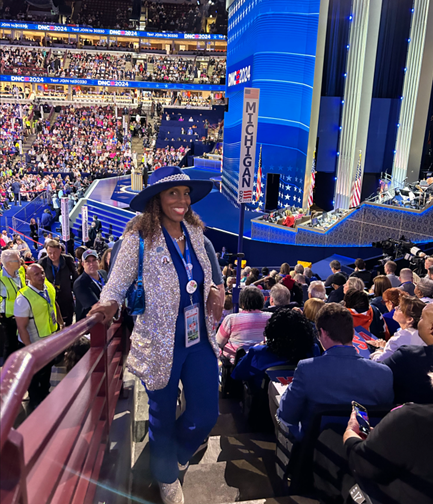
MEA members and staff totaled 20 delegates to the August convention—making up more than 10% of Michigan’s entire state delegation and of the total number from NEA. About 3,800 delegates from across the country delivered pledged votes to make Harris and Walz the party’s nominees.
Optimism also bloomed in delegate Robin Smith, an MEA-Retired former Lansing educator, vice chair of the Ingham County Democratic Party, and chair of the 7th Congressional District. Smith befriended Scrima amid the week’s whirl of activity, events, and meetings from morning to night.
The shared experience fed people’s resolve to mobilize for the future they wish to see, Smith said: “This is a movement, not a moment. A movement is when people are starting to act, and you could feel the energy of those in that room who are ready to go back home and take action.”
Smith grew up with working-class parents, both United Auto Workers—Dad at Fisher Body and Mom at Oldsmobile. Her grandmother talked of the fight against voting discrimination in the Civil Rights movement. Both parents volunteered at union halls to help people exercise voting rights.
“I remember the first presidential election that I voted in—I was 18 in high school—and we went as a family to vote,” Smith said. “I’ve carried that through with my own children because I wanted to show them what I knew to be true: Every voice matters; every vote counts.”
What most stood out for Smith at the convention was the unity, both in themes of the Harris-Walz campaign and the crowd’s powerful response. “So much has tried to divide us as a nation, but there are so many more ways that we are alike than we are different.”
She didn’t expect a woman of color to ascend to the presidency in her lifetime; that Harris is multi-racial like Smith makes the possibility extra meaningful: “Now with Kamala I believe we will bust through that glass ceiling, and the sky is the limit. It’s wonderful to see how she’s being embraced.”
Organized labor played a big role at the convention, she said, from delegates on the floor to leaders on stage, including NEA President Becky Pringle. “Every time I saw someone in an educator shirt or an IBEW shirt—any union—it was like seeing an old friend. It showed labor’s ability to mobilize.”
In a speech on the convention’s final night, Pringle said public education is on the ballot. The Biden-Harris administration has provided critical funding for student health and safety and delivered $4.8 billion in student loan debt relief to millions of educators—and counting.
In contrast Donald Trump favors voucher schemes to divert public funds to private schools, as do Republicans in Congress who recently tried to gut federal funding for high-poverty schools.
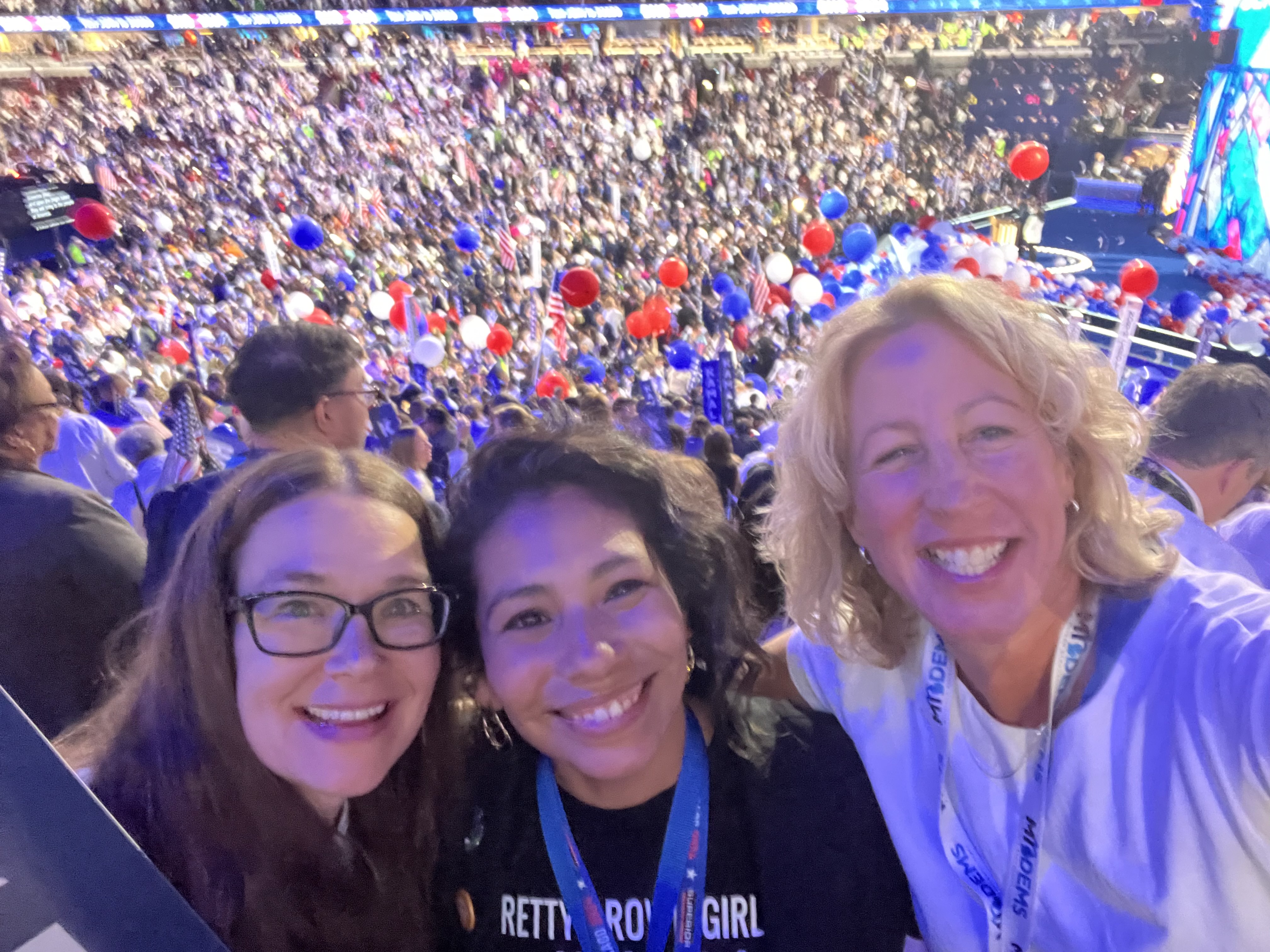
Trump has aligned with the far-right book-banning group Moms for Liberty, said immigrant children are “poisoning” schools, made bizarre claims about transgender people which endanger kids’ and educators’ safety, and called for school principals to be elected by parents.
Pringle said, “As an 8th grade science teacher for over 30 years, I can tell you that Kamala Harris and teacher Tim Walz understand when our public schools are strong, our nation is strong.”
The NEA Board of Directors recommended Harris in July after President Joe Biden withdrew from the race and endorsed his vice president. A former prosecutor, attorney general, and U.S. Senator, Harris has the qualifications, record, and commitment to deliver on education, the board said.
In 2017, then Sen. Harris opposed Trump’s appointment of Betsy DeVos as U.S. Secretary of Education, noting DeVos used her wealth to spur a proliferation of for-profit charter schools in Michigan with little oversight to protect children or taxpayers.
Harris said at the time DeVos’ voucher schemes would further drain public funds from neighborhood schools and result in “fewer teachers, fewer resources for students and parents.”
Collective bargaining and labor rights are core beliefs for Harris. In 2019 she stood in solidarity with striking teachers in Los Angeles and her hometown of Oakland, California, decrying it as “shameful” that educators can’t afford to live where they teach.
On Labor Day this year, she appeared in Detroit, focusing on Trump’s anti-union record and vowing to pass the Protecting the Right to Organize (PRO) Act. “The true measure of the strength of a leader is based on who you lift up,” she told the cheering crowd.
“In this election, there are two very different visions for our nation. Ours, focused on the future; the other, focused on the past. We’re not going back! We fight for a future where every person has the opportunity not just to get by but to get ahead.”
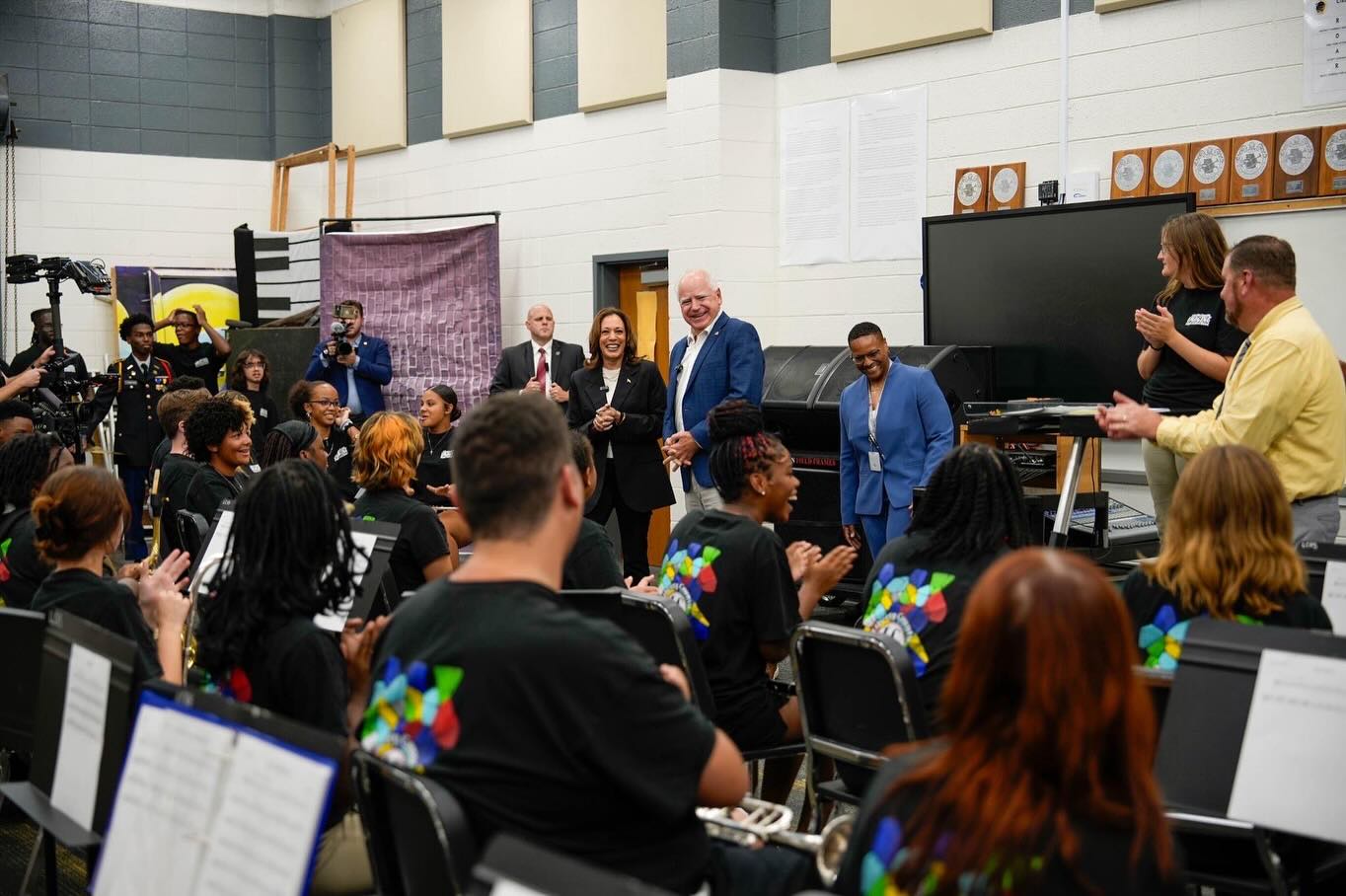
Growing up in a close-knit working-class neighborhood shaped Harris to become a lawyer “for the people” – a story she shared in her acceptance speech at the convention as the foundation of her beliefs.
“You can always trust me to put country above party and self, to hold sacred America’s fundamental principles. From the rule of law to free and fair elections to the peaceful transfer of power, I will be a President who unites us around our highest aspirations.”
The stories of Harris and Walz clearly highlight the significance of educators and public service, said MEA Vice President Brett Smith, who served as a convention delegate.
“The words of Kamala Harris and Coach Walz focused attention on what connects us as Americans—our shared values and commitment to building a brighter future for our children and our country,” Smith said. “We all felt like family, with everyone rooting for the same team.”
Walz worked as a high school social studies teacher for 17 years while also serving in various roles in the Army National Guard over 24 years. His students urged him to make his first run for Congress in 2006, he said in his acceptance speech at the convention.
“They saw in me what I had hoped to instill in them: a commitment to the common good, an understanding that we’re all in this together, and the belief that a single person can make a real difference for their neighbors.”
Walz won election to Congress as a Democrat in a deep red district despite having little experience or money to run. “Never underestimate a public school teacher. Never. I represented my neighbors in Congress for 12 years, and I learned an awful lot.
“I learned how to work across the aisle on issues like growing the rural economies and taking care of veterans. And I learned how to compromise without compromising my values.”
First elected Minnesota governor in 2018, Walz touted a law he signed in 2023 to provide all students with free breakfast and lunch at school. “While other states were banning books from their schools, we were banishing hunger from ours,” he said.
Walz ended with a rousing pep talk from his days as a high school football coach: “It’s the fourth quarter, we’re down a field goal but we’re on offense and we’ve got the ball. We’re driving down the field—and boy, do we have the right team.
“One inch at a time, one yard at a time, one phone call at a time, one door knock at a time, one five-dollar donation at a time. We’ve got 76 days. That’s nothing. There’ll be time to sleep when you’re dead. We’re going to leave it on the field.”
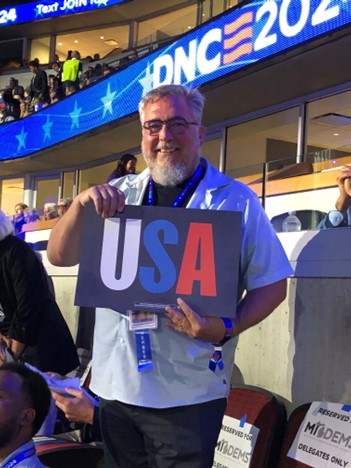
Harris and Walz brought much-needed positivity to the national campaign at a “pivotal moment in history,” said MEA member Jeff Pietrowski, a 28-year middle school history teacher and union leader in Grandville who participated as a first-time delegate at the convention.
The candidates are unifying the party around a central theme of freedom as essential to the healthy functioning of a democracy, Pietrowski said. If the enthusiasm they generate can spark strong voter turnout, that could help elect supportive candidates up and down the ballot.
With 33 U.S. Senate seats and all 435 House seats up for election nationally, control of Congress hangs in the balance, Pietrowski said, adding a Democratic trifecta would provide “immense opportunities” for Harris to achieve long-sought priorities, including public education advancements.
The same is true for local and state races on Michigan ballots. In the state House, Democrats are vying to keep or expand a 56-54 majority won in 2022. Other races include the state Supreme Court, Board of Education, and university governing boards at Michigan, Michigan State and Wayne State.
“Harris and Walz have infused us with renewed optimism about what’s possible this November,” Pietrowski said. “Now we must prioritize informing our members about what’s at stake and the critical importance of this election. We must fight for democracy and seize the opportunities before us.”
State Rep. Matt Koleszar, a former teacher and MEA member who now chairs the House Education Committee, said volunteers will be needed right up to election day on Nov. 5. “We need to talk with every voter, and we’ve got a great message to share,” he said.
Since last year, the state Legislature has substantially increased school funding, restored bargaining rights taken away under Gov. Rick Snyder, and ensured new school employees default to a retirement plan that includes pension benefits, among other wins for public education.
“If we lose the majority, all of that grinds to a halt—so there’s a lot on the table for voters who value public schools,” he said.
That urgency shows in folks of all ages doing campaign work and volunteering in Michigan, which sustains the energy, said Robin Smith, the Lansing schools retiree.
“I spent my time on the train home processing all of the wonderful things I got to experience at the convention and just feeling blessed and grateful, forever grateful,” Smith said. “I could feel the magnitude of this moment, what it means for our nation and for me as a Black woman.”
Once home, Smith shared one message. “What steps can each of us take to make our nominee the next president of the United States?”
Over in Berrien County, Scrima was motivating voters to recognize they can make a difference in a key swing state. She has seen it herself—having risen to leadership just a few years after first volunteering.
“We are Michigan; we know what this work looks like, and we know what it’s going to take to win,” Scrima said. “The whole world is counting on us to deliver for Harris-Walz, and imagine what more we can do if we deliver the U.S. Senate and the state House, too.”
That describes another factor that gets human beings to do hard things, Scrima added: “It’s an exciting part of democracy and also super-motivating to know you’re part of something bigger than yourself.”
Once people see collective action leading toward change, they jump on board, she said. “That’s what our young people need to hear. Heck, sometimes all of us need someone to shine a light and give us hope. Then we can do anything, and that’s as good as it gets.”
If you want to get involved in electing friends of public education up and down the ballot, go to meavotes.org and sign up.



